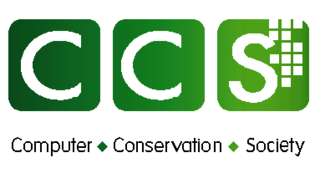The Association for Computing Machinery (ACM) is a US-based international learned society for computing. It was founded in 1947 and is the world's largest scientific and educational computing society. The ACM is a non-profit professional membership group, reporting nearly 110,000 student and professional members as of 2022. Its headquarters are in New York City.

The British Computer Society (BCS), branded BCS, The Chartered Institute for IT, since 2009, is a professional body and a learned society that represents those working in information technology (IT), computing, software engineering and computer science, both in the United Kingdom and internationally. Founded in 1957, BCS has played an important role in educating and nurturing IT professionals, computer scientists, software engineers, computer engineers, upholding the profession, accrediting chartered IT professional status, and creating a global community active in promoting and furthering the field and practice of computing.
Computer ethics is a part of practical philosophy concerned with how computing professionals should make decisions regarding professional and social conduct.
Donald William Gotterbarn is a computer ethics researcher. Gotterbarn received his Ph.D. in Philosophy in 1971 from the University of Rochester. He also earned his M. Div. from the Colgate Rochester Divinity School.
The International Federation for Information Processing (IFIP) is a global organisation for researchers and professionals working in the field of computing to conduct research, develop standards and promote information sharing.

The Computer Conservation Society (CCS) is a British organisation, founded in 1989. It is under the joint umbrella of the British Computer Society (BCS), the London Science Museum and the Manchester Museum of Science and Industry.

Simon Peyton Jones is a British computer scientist who researches the implementation and applications of functional programming languages, particularly lazy functional programming.
CIPS is the professional association of IT professionals in Canada. Since 1958 CIPS has helped strengthen the Canadian IT industry by establishing standards and sharing best practices for the benefit of individual IT professionals and the sector as a whole. CIPS represents thousands of members across the country as Canada’s Association of Information Technology Professionals.
The Australian Computer Society (ACS) is an association for information and communications technology professionals with 40,000+ members Australia-wide. According to its Constitution, its objectives are "to advance professional excellence in information technology" and "to promote the development of Australian information and communications technology resources".
Amanda Elizabeth Chessell is a computer scientist and a Distinguished Engineer at IBM. She has been awarded the title of IBM Master Inventor. She is also a Member of the IBM Academy of Technology.

Cyber ethics is the philosophic study of ethics pertaining to computers, encompassing user behavior and what computers are programmed to do, and how this affects individuals and society. For years, various governments have enacted regulations while organizations have defined policies about cyberethics.
John Weckert is an Australian philosopher who has been an influential figure in, and substantial contributor to the field of information and computer ethics. He has published many books and journal articles outlining his research in this field.
Jeroen van den Hoven is a Dutch ethicist and a philosophy professor at Delft University of Technology. He specializes in ethics of information technology.
Ronald Eugene Anderson, also known as Ron Anderson, was an American sociologist. He was a Professor Emeritus at University of Minnesota in Twin Cities where he taught sociology from 1968 to 2005. His early work focused on social and institutional factors shaping the diffusion of technology-based teaching. Since 2007, his work has focused on web-based compassion and world suffering.
The Swiss Informatics Society, short "SI", is a Swiss organization of computer science educators, researchers, and professionals.
This article gives an overview of professional ethics as applied to computer programming and software development, in particular the ethical guidelines that developers are expected to follow and apply when writing programming code, and when they are part of a programmer-customer or employee-employer relationship. These rules shape and differentiate good practices and attitudes from the wrong ones when creating software or when making decisions on a crucial or delicate issue regarding a programming project. They are also the basis for ethical decision-making skills in the conduct of professional work.
The network and service management taxonomy serves as a classification system for research on the management of computer networks and the services provided by computer networks. The taxonomy has been created and is being maintained by a joint effort of the Flamingo FP7 Project and the Committee of Network Operations and Management (CNOM) of the Communications Society (COMSOC) of the Institute of Electrical and Electronics Engineers (IEEE) and the Working Group 6.6 of the International Federation of Information Processing (IFIP). The taxonomy is organized into seven categories. The first four categories identify what kind of network/service/business aspect is being managed and which functional areas are covered. The remaining three categories identify which management paradigms, technologies, and methods are used.
Tore Dybå is a Norwegian scientist and software engineer in the fields of information systems and computer science. He has been a Chief Scientist at SINTEF ICT since 2003.
Carol Spradling is an American professor, computer scientist who served as the first Director of the School of Computer Science and Information Systems at Northwest Missouri State University in Maryville, Missouri. She is known for her work with computer ethics, profession-based education, interactive media, and expanding the involvement of underrepresented groups and women in computing. Dr. Spradling taught computer science courses and served as a provost fellow and a liaison to the Northland Center For Advanced Professional Studies program. Spradling served on the Missouri Department of Higher Education Panel on The Role of Faculty in Establishing and Implementing a Blueprint for Missouri Higher Education.

Hussein S. M. Zedan was a computer scientist of Egyptian descent, mainly based in the United Kingdom.





